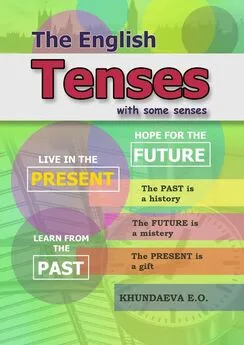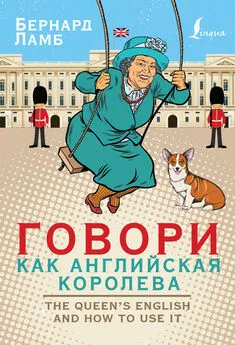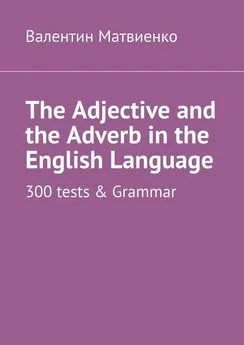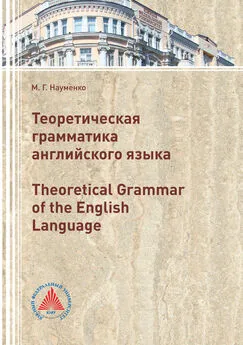E. Khundaeva - The English Tenses
- Название:The English Tenses
- Автор:
- Жанр:
- Издательство:неизвестно
- Год:неизвестен
- ISBN:9785449377845
- Рейтинг:
- Избранное:Добавить в избранное
-
Отзывы:
-
Ваша оценка:
E. Khundaeva - The English Tenses краткое содержание
The English Tenses - читать онлайн бесплатно ознакомительный отрывок
Интервал:
Закладка:
She’ll give (поставить) you a mark (оценка), won’t she?
It will be a five, won’t it (не так ли)?
I daresay (осмелюсь сказать) it will (что да).
They will stay (остаться) there for long (надолго), do you think (думаешь)?
The interrogative questions
The general questions
Will you go there tomorrow?
Will they come the day after tomorrow (послезавтра)?
Will you be in Ulan-Ude in (через) a day?
Will you arrive (прибывать) in Moscow in a day or two?
Will they arrive at the township (посёлок городского типа) in a week?
Will you come and see us (навестить) in (через) some time?
Will you land (приземлиться) in several minutes?
***
Will she come and see you soon?
Will they be at your place (у вас) soon?
Will they visit you in January?
Will they inform us of the results of the competition (конкурс) for grant?
Will they come to our place (к нам) the next Sunday?
Will she come the day after tomorrow (послезавтра)?
The special questions
Who will arrive (прибывать) soon?
When will they arrive?
What will they do here?
What will be their main (главный) purpose (цель)?
Where will they stay (остановиться)?
Who will they meet (встречаться) with?
Who will they consult with?
The alternative questions
Will they come in (через) a day or two?
Will you also (тоже, также) come in a day or two?
Will she come and see us in (через) some time?
Will Alex be here in several hours (через несколько часов)?
Will you arrive (прибывать, приезжать) the next week?
Will you all be here the next month?
Will they meet in (через) a year and have a big feast (праздник, пиршество)?
Task
Think of (придумать, составить) your own sentences with the above (вышеприведенный) words.
The tag questions
He will translate this text with a dictionary (словарь), won’t he?
You will translate the text with a dictionary too, won’t you?
Ann will translate her text with no dictionary (без словаря), I guess (полагаю, думаю, догадываюсь), won’t she?
She will make use of (использовать) the context, I gather (думать, делать вывод), won’t she?
You’ll show your translation to the teacher, won’t you (не так ли)?
She’ll give (поставить) you a good mark (оценка), won’t she?
It’ll sure (несомненно, конечно) be a five, won’t it (не так ли)?
I daresay (осмелюсь сказать) it will be, won’t it?
The negative sentences
I won’t go there (Я не пойду туда).
You won’t talk (разговаривать) to them.
He won’t believe (верить) you.
She won’t enter (поступать) that college.
We won’t stay (останавливаться) in that hotel.
You won’t send (отправлять) that fax (факс).
***
They won’t have many questions to put (У них не будет много вопросов).
We won’t have many requests to make (У нас не будет много просьб).
They won’t have any claims (претензия, требование). It was the juncture of the events (стечение обстоятельств), just the coincidence (совпадение).
I won’t stay there for long (Я не буду там долго).
I won’t have any reproaches (упрек) and I won’t have any self-reproach (упрек самому себе) too. It was the concurrence (стечение) of the circumstances (обстоятельство).
UNIT 2
The Progressive (Continuous) Tense
The distinctive features (отличительный черты):
1. Процесс, происходящий в определенный конкретный момент (период). Временные индикаторы: now, at 5 o’clock, when I came, etc.
2. Параллельно происходящие действия, события или состояния. Временной индикатор: while (пока; в то время, как …).
3. Процесс, охватывающий период времени: from… till (от… до).
The present Progressive Tense
The affirmative sentences
I am reading a book. Я сейчас читаю книгу.
You are translating the text.
He is working at this problem.
She is writing a letter.
We are thinking over (обдумывать) the problem.
You are discussing how (как) to do it.
They are waiting for (ждать) the manager.
I’m talking to them now.
***
Translate, please.
Мы сейчас учим английский язык. We are learning English now.
Мы завтракаем (We are having breakfast), приходите немного попозже (a little later).
Мы сейчас выполняем совместный проект (complete a joint project).
Мы сейчас работаем над методологией исследования (methodology of the study).
Сейчас я консультирую детей (I am consulting the children).
Мы сейчас печатаем заявку (type an application).
Мы сейчас продолжаем (continue; go on with) исследование.
The interrogative questions
The general questions
Are you writing your resume? Yes, I am. I’m just writing my resume. I was asked to (меня попросили).
Is he writing an article for the newspaper? I think so (думаю, что да).
Is Nina calling (звонит) you? No, it’s Ann.
Are we going to the Ivanovs (Ивановы; семья Ивановых) first (сначала)? Yes, right.
Are your friends calling you just now? Yes, these are my friends.
***
Read the following funny (cмешной) sentences, please
– Is the frog (лягушка) smiling (смеяться)? – Oh yes, it is just smiling. Right you are (вы правы).
– Is the beetle (жук) doing nothing (ничего)? – That’s right, it is doing nothing. It is not doing anything.
– Are the bears (медведь) carrying (нести; носить) milk (молоко)? – They aren’t carrying any milk. It seems (кажется) they are carrying honey (мед).
– Is the fish (рыба) eating (кушать, есть) a pine-apple (ананас) or an apple (яблоко)? – It is sure (конечно, несомненно) eating a pine-apple.
– The frog (лягушка) is watering (поливать) the flower (цветок), isn’t it? – You aren’t mistaken. It is just watering the flower.
The special questions
Who are you talking to?
What are you doing now?
When are you going to Irkutsk?
Where are they going now?
How are they solving their problems (решать свои проблемы)?
How long are they playing?
Which place are you leaving for (уезжать)?
***
Who is playing chess with my nephew (племянник)?
Who is my niece (племянница) playing with?
What game are the children playing?
Where are the children playing?
When are they coming home?
How are they doing sums (решать задачи)?
How long are they staying (пребывать, находиться) in the health resort (курорт)?
***
Who is running along the road?
What is the boy keeping (держать) in his hand?
Which of them (кто из них, который из них) is running very quick?
Where are they running?
When are they coming here?
How is she performing (исполнять) her part (роль)?
How long are they playing in that playground (игровая площадка)?
The alternative questions
Was your acquaintance doing shopping or just window-shopping?
Is Nick reading a newspaper or a magazine?
Is she reading a textbook (учебник) or a glossy magazine (глянцевый журнал)?
Are you translating an article or a letter?
Is she writing a letter or an article?
Were you thinking over (обдумывать) this problem or another one?
Are you discussing how to do it or are you just having a chat (болтать)?
The tag questions
You are watching TV now, aren’t you?
Your neighbor is looking through the window, isn’t she?
Your colleague is reading a detective story now, isn’t he?
Ann is reading a book, isn’t she?
You are learning English, aren’t you?
They are reading the textbook (учебник), aren’t they?
Translate, please
Мы сейчас учим английский язык, не так ли (aren’t we)?
Мы сейчас выполняем совместный проект (complete a joint project), так (aren’t we)?
Мы сейчас работаем над методологией исследования (methodology of the study), ведь так?
Сейчас я консультирую детей (consult the children), так ведь?
Мы сейчас печатаем заявку (type an application), не так ли?
Они сейчас продолжают (continue; go on with) исследование (study), правда?
Они сейчас едут сюда, так ведь?
The negative sentences
I am not reading that book, I have finished reading it. You can take it.
You aren’t reading the magazine, can I take it?
He is not writing the letter as I see. When is he going to finish it?
We are not dealing with (заниматься) that project, we are doing something else (другиe вещи, что-то ещё).
I am not reading that book.
You are not writing a letter.
He is not working at the project now.
She is not looking through (просматривать) any glossy magazine (глянцевый журнал).
They are not writing any substantiation (обоснование) of the project.
The Past Progressive tense
The affirmative sentences
I was washing (мыть) the dishes (посуда) when they called (позвонить) me.
You were looking through (просматривать) the documents at that moment.
She was packing up (упаковывать вещи) when she learned (узнать) about that.
We were talking (разговаривать) when he interrupted (прерывать) us.
They were discussing the matter (этот вопрос) when Alice entered (входить) the room.
***
We were preparing (писать, готовить) a monograph (монография, книга) when we got (получить) the news (новости) concerning (относительно) the announcement (объявление) of a competition (конкурс) for a short-term (краткосрочный) grant in the humanities (в области гуманитарных наук).
Читать дальшеИнтервал:
Закладка:










